Navigating trans healthcare in the Netherlands can appear overwhelming, but accessing gender-affirming care is possible — if you know where to look.
Moving to a new country as a trans or gender non-conforming person involves a lot of extra research, including on how to access gender-affirming care as an international.
The good news, though, is that there is plenty of information and support out there!
Here’s everything you need to know to access trans healthcare in the Netherlands. 👇
The current state of Dutch trans healthcare
For a country with a worldwide reputation of openness towards the LGBTQIA+ community, the Netherlands could definitely do better when it comes to the T in the acronym.
On the bright side, in the Netherlands:
- being trans is not criminalised (the bar really is low…),
- people theoretically can change their legal gender without undergoing hormone treatment or surgery, and
- many Dutch insurances reimburse a decent amount of gender-affirming care treatments, provided that they have contracts with the institutions performing them
However, access to trans healthcare is made more complicated by language barriers, bureaucracy, and a good dose of transmedicalist or downright transphobic institutional bias.
What does this mean in practice? Let’s get down to it.
Transitioning in the Netherlands: The typical steps
The most straightforward way to access gender-affirming care in the Netherlands is through a gender clinic.
The advantages of these medical centres are that:
- they employ qualified professionals specialised in trans healthcare,
- they offer a very comprehensive range of health services, and
- They often work with Dutch insurances, meaning that many procedures can get partially or fully reimbursed.
Usually, gender clinics assist people in their transition through the following steps:
- Psychiatric counselling
- Gender dysphoria diagnosis
- Hormone Replacement Therapy (HRT)
- Gender-affirming surgery(ies)
- Legal name and gender change
Accessing a Dutch gender clinic
If you’d like to approach your transition as described above, registering with a gender clinic can be a great choice, as the centres often offer multiple services under one roof, saving you some time and money.
Dutch gender clinics are accessible to anyone who legally resides in the Netherlands and has a Dutch GP and health insurance, regardless of nationality. These are usually strict requirements, but there are some rare exceptions, such as the Trans United Clinic in Amsterdam.
Waiting lists for Dutch gender clinics, however, are often long, and people can end up waiting for up to four years before a spot becomes available.
Once it does, the first step is an intake or screening interview, during which data from previous health providers is also reviewed.
If the appointment establishes that the clinic’s services match your needs, the next steps are evaluated together with a professional “gender team” (genderteam), usually starting from the diagnostic process.
Pro tip: For an overview of the gender clinics currently active in the Netherlands, consult this comprehensive interactive map, made by Transvisie and Transgender Netwerk.
Finding a trans-friendly GP in the Netherlands
As a trans person, finding the right General Practitioner (GP) can make all the difference.
In the Netherlands, GPs can prescribe hormones, which potentially allows trans patients to access HRT or at least be referred to an endocrinologist without getting a formal gender dysphoria diagnosis, speeding up the process.
However, only a minority of Dutch GPs are currently willing to prescribe hormones or have the necessary training to help their trans patients.
Things are slowly changing, though, and several trans organisations have compiled lists of trans-friendly healthcare professionals, including GPs, psychologists, psychiatrists, endocrinologists, and other professionals.
Looking for a trans-friendly healthcare professional in the Netherlands? Check out this map by Transvisie and Transgender Netwerk, or contact one of the organisations mentioned in the Support & Community section below.
Getting a dysphoria diagnosis in the Netherlands
While HRT can technically be prescribed by GPs without presenting a gender dysphoria diagnosis, in practice, the diagnosis is necessary for virtually every step of transitioning.
You will need a diagnosis to access HRT through a gender clinic, to increase the chances of having surgery plans approved, and to increase the chance of gender and/or name change requests being successful.
READ MORE | Mental healthcare in the Netherlands: all you need to know for 2025
In the Netherlands, only licensed psychologists, psychiatrists, and certain sexologists can diagnose gender dysphoria, usually after a minimum of five sessions and filling out several questionnaires, which are sometimes only available in Dutch.
Choosing the best Dutch health insurance for gender-affirming care
As you might already know, everyone living or working in the Netherlands must take out standard health insurance. For trans people, this step is even more critical, as most Dutch insurance companies can help cover the medical costs related to transitioning.
READ MORE | 9 things you need to know about Dutch health insurance as an international
Up until 2024, trans organisations recommended that people in need of gender-affirming care choose a Dutch insurance company and, specifically, pick the restitutiepolis, a “reimbursement policy.”

However, this type of policy was scrapped in 2025. The new advice is to take out a combinatiepolis, a combination policy, even though it means having to shoulder a portion of the costs most of the time.
This policy allows for the greatest freedom in terms of choosing your preferred healthcare providers among those who have a contract with your insurance.
READ NEXT | Toeslagen: save money with these allowances in the Netherlands
As for who covers what, contracts vary throughout time, but in general, international insurance companies and student plans tend to offer the least coverage for gender-affirming care.
In any case, before choosing a Dutch insurance provider, you should contact them with specific questions about the medical treatments you plan on having, or consult one of the trans organisations listed below, as many of them offer insurance advice.
Starting Hormone Replacement Treatment in the Netherlands

Hormone Replacement Treatment (HRT) consists of the administration of hormone medications meant to help people align their physical characteristics with their gender identity.
READ NEXT | Dutch Quirk #104: Be prescribed only paracetamol by every Dutch doctor
As one of the most common trans healthcare needs, accessing this gender-affirming treatment is crucial to many trans people. For transmasculine people, this usually means taking testosterone, while for transfeminine people, it involves both estrogen and anti-androgens.
HRT should always be initiated in consultation with an endocrinologist or, at least, one’s GP, and should be monitored through regular check-ups, such as blood tests monitoring hormone levels.
READ NEXT | The ultimate guide to gynaecology, birth control, and check-ups in the Netherlands
The official channel to start HRT in the Netherlands is by referral to an endocrinologist, which can be obtained from your GP or your gender clinic, almost always after getting a gender dysphoria diagnosis.
Undertaking HRT through official channels is not only the safest option, but also the only way to be eligible for at least partial reimbursement by Dutch health insurers.
Getting gender-affirming surgery through Dutch healthcare
In the Netherlands, certain gender-affirming surgeries can only be accessed through gender clinics. This means they can only be pursued in consultation with a team of psychologists, endocrinologists, and surgeons.

This is the case for chest reconstruction (top surgery) and genital reconstruction (bottom surgery), two of the most common kinds of surgeries within trans healthcare.
As with Hormone Replacement Treatment, these more usual types of gender-affirming care are often at least partially reimbursed by Dutch health insurers, if they have a contract with the institution performing them.
READ MORE | All you need to know about going to the hospital in the Netherlands
Other procedures, for example, breast enlargement or facial and body hair removal, may also be accessed without medical approval.

However, for these procedures to be even partially reimbursed by insurance, they must be deemed a “medical necessity” by a Dutch doctor.
This can sometimes represent a challenge, which is why these steps, too, are easier to undertake with the assistance of a gender clinic or a trans-friendly GP.
Changing legal name and gender markers in the Netherlands
While not strictly pertaining to trans healthcare, legal matters such as how to change one’s official name or gender marker are an essential part of transitioning for many people, and can arguably be considered integral to gender-affirming care.
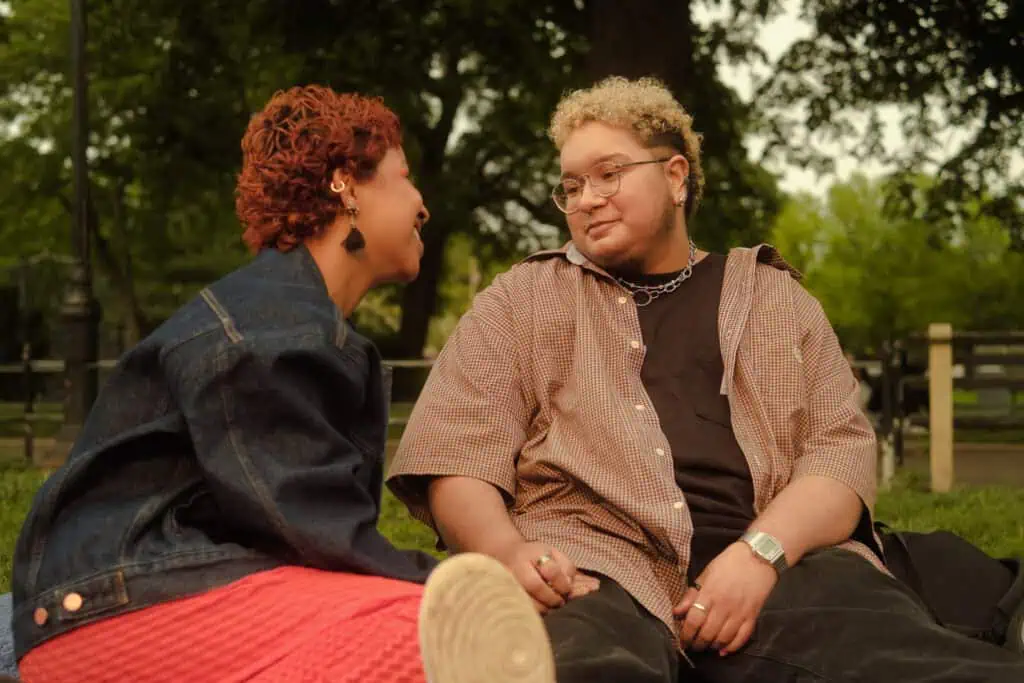
Here’s how to navigate these legal procedures in the Netherlands. 👇
Changing a legal name in the Netherlands
Depending on your nationality, saying doei to your deadname in the Netherlands can be tricky.
According to Dutch law, this can only be done if the person’s country of origin allows for the name change. If it does, they can follow the same name change procedure as Dutch nationals.

In that case, if you only wish to change your first and/or middle name and not your gender marker, you must go through the same procedure as any Dutch person wishing to modify their first name, regardless of the reason.
This process involves filing a court petition through a lawyer, which is quite costly. The total price, including court proceedings, lawyer fees, and taxes, varies case by case, but it ranges between €700 and €1500.
READ NEXT | Everything you need to know about mediators in the Netherlands
Usually, if the court determines that the person requiring the name change has “sufficient vital interest” (voldoende zwaarwichtig belang) to do so, no actual court hearing is required, and the change is approved within about three months.
Let op! The name change request can be rejected, and the rejection can be appealed, bringing the actual average length of the process to eight months.
Changing the gender marker on Dutch documents
Changing the gender marker on Dutch documents is usually easier and cheaper than changing a name only.
And the best news is: if your nationality allows for the name change, you can do both things at once.

Technically, changing your gender marker from M to F or vice versa is free of charge — but there are some hidden costs.
People wishing to change their legal gender on Dutch documents as non-Dutch citizens must:
- Be over 16
- Have resided in the Netherlands for over 12 months
- Provide a copy of their birth certificate
- Provide documents on their parents’ marital status at the time of their birth
- Provide adoption documents, if applicable
- Provide a “Change of Gender” statement
Once you’ve fulfilled these requirements, you can apply for the gender marker change at the municipality where your birth certificate was issued or, for people born abroad, at The Hague municipality.
READ NEXT | The Dutch integration (inburgering) exam: the ultimate 2025 guide
You’ll be given an in-person appointment, and if everything is in order, within about two months, your gender marker will be changed in the Dutch Personal Records Database (BRP).

This is done by adding an appendix to your birth certificate, obligating all Dutch institutions directly connected to the BRP to adjust your gender marker automatically.
However, you will have to renew all your Dutch documents yourself (passport, identity card, driving license), covering the costs.
Obtaining a “Change of Gender” statement
One of the trickiest (and most expensive!) steps to changing the gender marker on Dutch documents is to procure the “Change of Gender” (wijziging geslacht) statement.

If you manage to obtain this statement from one of the licensed professionals accompanying you in your transition, such as your psychologist or a doctor from your gender clinic, this is sometimes free of charge.
Otherwise, it can be quite costly: obtaining the statement from Amsterdam UMC as an out-patient, for instance, costs €65 for the expert statement itself, plus €250 for each of the interviews the expert deems necessary.
READ MORE | 11 money-saving hacks for life in the Netherlands
Also, for the statement to be valid for your gender marker change application, it cannot be more than six months old.
You can check which professionals are recognised as valid gender experts on this webpage.
Pro tip: Some municipalities, such as The Hague, have schemes to (partially) reimburse costs related to gender marker changes to their residents. Check with your municipality to find out if that’s the case for you!
Alternative routes to gender-affirming care
There are multiple legal, financial, and self-determination reasons why the transition journey described above may not fit your situation.

There are as many routes and approaches to transitioning as there are trans people: here are some alternative routes to accessing trans healthcare in the Netherlands.
Choosing the DIY route to trans healthcare
Many trans and gender-diverse people face legal, financial, and ideological barriers to accessing Hormone Replacement Therapy (HRT) in the Netherlands.
Sometimes, due to these barriers or excessively long waiting lists for gender-affirming care, people resort to self-administering HRT, a route also known as DIY or self-medication.
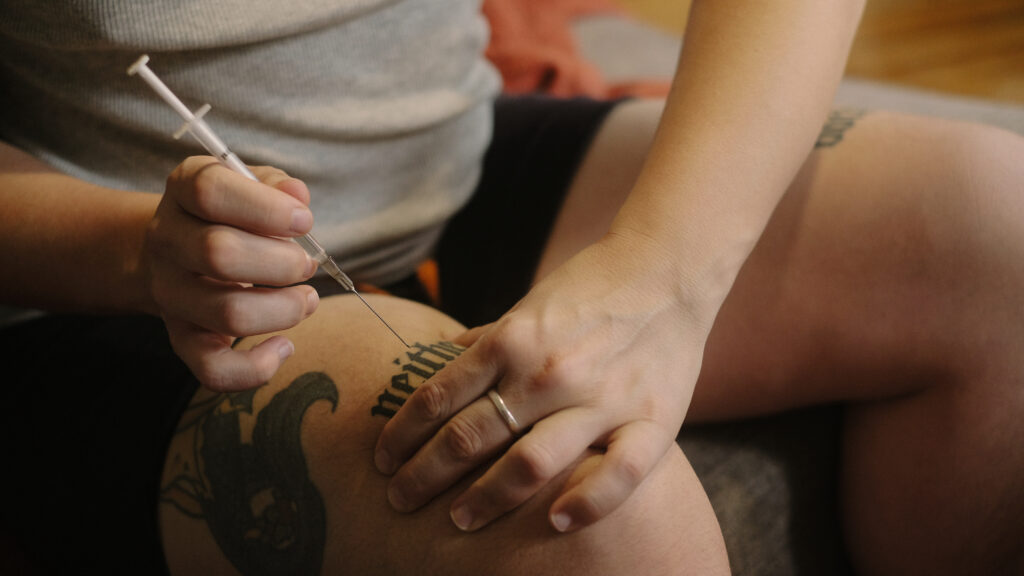
This route is discouraged for multiple reasons:
- Health risks associated with initiating hormone treatment without adequate medical advice and monitoring
- Legal risks related to obtaining substances illegally
READ NEXT | 12 weird laws the Netherlands still has in 2025
Should you decide to pursue it anyway, this is the Netherlands-specific information about DIY-ing HRT you should know:
- Estrogen and Progesterone can usually be bought and owned legally in the Netherlands
- Testosterone is a controlled substance, and there are legal consequences for purchasing it without a prescription, especially if it’s imported from abroad
- Starting HRT independently will not impact future treatment by a Dutch gender team or GP. As such, there is no reason to hide it from medical professionals
- For health reasons, you should always inform your GP about your DIY hormone usage
Non-binary: Getting an “X” gender marker on your Dutch documents
For non-binary or gender non-conforming people wishing to change their gender marker on Dutch documents to an “X” as opposed to an “F” or “M”, the process is more complicated and costly.
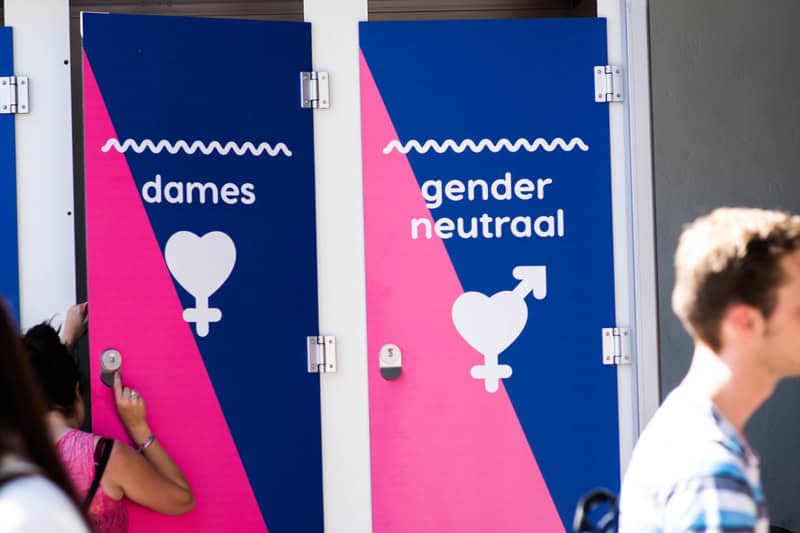
Getting an “X” on your papers must be arranged through the legal system, following a procedure similar to the one for changing one’s legal name detailed above.
This involves both administrative and court costs, often amounting to €1000 to €2000. The process is also quite lengthy, averaging between three and nine months.
For more information about the requirements for getting an “X” gender marker on Dutch papers, consult dedicated webpages by organisations such as Transgender Netwerk.
What if I already started transitioning independently, or in another country?
People who started their transition journey in another country and wish to continue it within the Dutch trans healthcare system can often do so, provided they bring all related documentation when moving to the Netherlands.
READ NEXT | Why expats struggle with mental health in the Netherlands — and what you can do about it
In any case, it is advisable to have the documents (gender dysphoria diagnoses, HRT prescription, health records) officially translated into Dutch or English to increase the chances of Dutch professionals or institutions accepting them.
If you’ve started medically transitioning independently, for instance by self-administering HRT, you may also be able to continue your gender journey through official channels.

Ultimately, however, whether your previous gender-affirming care is recognised by the Dutch system varies case by case.
Also, regardless of how you started transitioning, you should know that having already received some gender-affirming care won’t necessarily speed up the process of accessing Dutch trans healthcare, as waiting lists often do not make this distinction.
Finding support within the Dutch trans community
Dutch trans healthcare is far from perfect, but you don’t have to deal with all of this alone.
Here are some Dutch trans organisations and communities you can turn to for support, advice, or simply meeting new friends (also in English!). 👇
| Name | Location | Type of assistance |
|---|---|---|
| Transvisie | Countrywide network | Support for gender-questioning people, their family, and their loved ones |
| Genderpraatjes | Online | Youth hotline for support and questions about gender |
| Trans in Eigen Hand | Online | Empowerment of trans people in Dutch gender care |
| Trans United Europe | Countrywide network, gender clinic in Amsterdam | Empowerment of the BPOC trans community, policy advice and advocacy |
| Transgender Netwerk | Countrywide network | Advocacy for and education about trans rights and healthcare |
| Trans in NL Advice Line | Online | WhatsApp line for trans migrants to the Netherlands, available in English, Spanish, and French |
| Trans Zorg Nu | Countrywide network | Advocacy to improve Dutch trans healthcare |
| Trans Utrecht & Beyond | Utrecht (and beyond 😉) | Events by and for trans and non-binary people, with a special eye for (neuro-)accessibility |
| Trans Radical Resource Exchange (T-RREx) | The Hague | In-person English-speaking events to exchange trans resources and harm reduction practices (@trrex_denhaag) |
Have you or someone you know dealt with Dutch trans healthcare? Tell us about your experiences in the comments below.
Trans healthcare in the Netherlands: Frequently asked questions
How do I transition in the Netherlands as an international trans person?
The most straightforward way to transition as a trans international residing in the Netherlands is to register with a Dutch gender clinic.
How can I access Hormone Replacement Treatment in the Netherlands?
Accessing Hormone Replacement Treatment in the Netherlands requires a prescription by a licensed healthcare professional, such as your GP, or a specialist from your gender team if you rely on a gender clinic.
Can I get gender-affirming surgery through the Dutch healthcare system as an international?
Internationals who legally reside in the Netherlands and pursue their gender transition through the Dutch healthcare system can undergo gender-affirming surgery in the Netherlands.
Can I change my legal name and sex in the Netherlands as an international?
Changing your gender marker on Dutch documents as an international is usually possible if you comply with the administrative requirements. Depending on your nationality, however, changing your legal name(s) might be more difficult or impossible.
Which Dutch health insurance should I pick as a trans person?
Dutch trans organisations advise gender-diverse people living in the Netherlands to choose a Dutch insurance with a combinatiepolis, a combination policy, and to check with the specific insurance which gender-affirming services they cover before making a definite choice.
Feature Image: Vice Media/CC BY-NC-ND 4.0/Cropped





